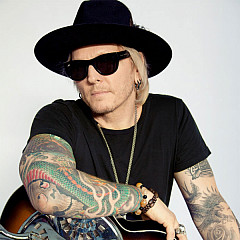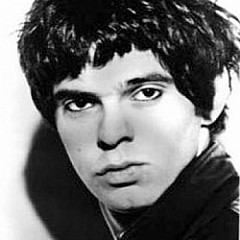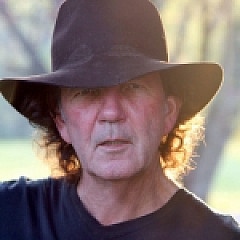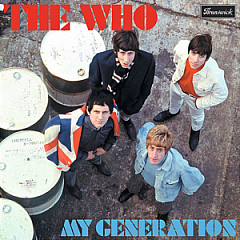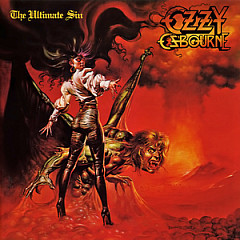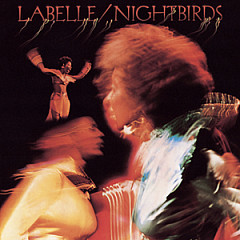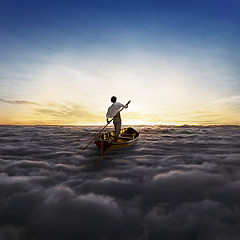 Some rock artists like to use the phrase, "We're much more popular overseas." And while that may be the easy way of passing the buck regarding those whose career is on the downswing, this is a true statement when it comes to Canadian metallists, Annihilator. Long lead by songwriter/guitarist Jeff Waters, the band remains incredibly popular in Europe (where they spend most summers playing mammoth festivals), as well as other faraway locales. But maddeningly, commercial success has remained elusive in North America.
Some rock artists like to use the phrase, "We're much more popular overseas." And while that may be the easy way of passing the buck regarding those whose career is on the downswing, this is a true statement when it comes to Canadian metallists, Annihilator. Long lead by songwriter/guitarist Jeff Waters, the band remains incredibly popular in Europe (where they spend most summers playing mammoth festivals), as well as other faraway locales. But maddeningly, commercial success has remained elusive in North America. That's not to say the band hasn't earned several career high points, however, such as touring Europe in the early '90s as part of a bill that included headliners Judas Priest (who were supporting their classic Painkiller album) and a then-largely unknown Pantera, issuing such prog metal classic albums as Alice in Hell and Never, Neverland, and Waters coming in at a staggering #3 in author Joel McIver's book, 100 Greatest Metal Guitarists (above the likes of Dimebag Darrell, Tony Iommi, and Tom Morello).
Waters chatted with Songfacts (via a phone call we placed to the Great White North), and tackled such topics as the pros and cons of writing many Annihilator songs by himself, the stories behind several headbanging classics, and how he survived metal's dark mid-late '90s period.
Jeff Waters: Hmm. That's a tough one. I've got to be honest: After being the main songwriter since the first record we did in '89 - the main guy doing 90 to 100 percent of the writing on the records - it's very tough to come up with stuff sometimes. You get writer's block or you just simply come up with stuff that you're kind of repeating from the past. Feast is our 14th record, so I've got to work very hard at that.
But like a lot of writers, I try to change certain things up to get inspired. A lot of times writers will write after they get off the road and they're all psyched about playing with other bands and hearing riffs from other bands live. Just seeing concerts or whatever things in your life you experience that might inspire you.
But I think the actual songwriting process is kind of hard to deviate from: You're kind of born with, "Okay, this is how I do it," and it's tough to get outside of that. There are some writers that can do that, which is just genius talent. But I don't continually listen to music - especially new music - and I don't practice guitar all the time like I did when I was younger, just because there are so many other things I have to do involved in the group and life in general. So I don't progress, really, as a guitar player that much and I don't progress as a songwriter that much.
I'm simply, in a way, rehashing everything that I've soaked up in the first 10 years of my metal life that just keeps coming out in the songs. I'm sure if I went out and started listening to a lot of other new bands it would influence what I'm doing, but it's not really what I want to do or what I'd like to do. I just like what I'm doing.
The key for me is I've got to really work hard to review what I've written right after I write something and take at least a minute away from it or a day or whatever and say, "Holy crap, is this a Slayer riff, for crying out loud?" You know what I mean? Like, sometimes you get too close to your favorite bands.
 But as long as you can be a bit objective and can squeak by and later on you look back at records and go, "Darn, that song could have been better," or "This really sounded like an Iron Maiden harmony style." But that's like a tribute. It's where I got my stuff from the in the first place, as a fan and guitar player.
But as long as you can be a bit objective and can squeak by and later on you look back at records and go, "Darn, that song could have been better," or "This really sounded like an Iron Maiden harmony style." But that's like a tribute. It's where I got my stuff from the in the first place, as a fan and guitar player.Feast is really no different. I just got lucky in the sense that I think somehow the songs on that one, at least the first half of the record, the songs sort of stepped up a level from the previous couple. Then again, when I say that a lot of people will argue and say, "No, no. Three records ago was your best one lately." And some will say the last one. I'm lucky I'm in a band that doesn't have the same style every single record and there's little different styles of music that slip in there. Some people like the changes, and some people don't.
But I think Feast just got lucky because our singer Dave Padden and I were in a good frame of mind and something was different. I have no idea what it was. I think everybody agrees - at least overseas - it's a better album that we've been putting out lately.
Hey, imagine if there was a drug or a pill or something that could make a perfect song or the perfect record every time. AC/DC would have 15 Back In Blacks by now.
Songfacts: You were saying that you write the majority of the songs. Is there ever a point that you regret not having a songwriting partner?
Jeff: Yeah. I find that some of the songs that I have written on some of the records, I'm going to take a wild guess, but there's been some kind of co-collaboration, maybe an average of two songs per record I do. And honestly, my favorite songs from Annihilator are usually the ones that I've collaborated with someone else. I have some songs that I think are really, really good that I've written myself, but it's just having even one other person sit there and co-write lyrics or write the lyrics for your song, like my singer Dave Padden's done on a couple of albums lately. "King of the Kill," "Alison Hell," "Set the World on Fire," those were all collaborations.
Sure, I was the driving force and I'd write most of it. But lyrically, especially lyrically, that's where a collaboration would really benefit my band, as well as producing. I produce all my own records and record, mix, engineer, and master. But I do it because financially it's extremely expensive to hire people to do that. I've had my own studio since '94, and it's extremely expensive to hire all these other people to do the job. I don't think I would have survived with Annihilator if I had to pay all this money to get it done, so I adapted and learned how to do it myself.
It's the same with songwriting: If I have somebody available, like my singer Dave, and he wants to write the entire record on lyrics, he will. I've asked him over and over again, and he actually is not really interested in doing it. He's got his own thing and he's always busy. I try to sneak him in on a few songs when he gets here to record our records and say, "Dave, listen, I left you a few songs. Go home to my parents' house where you're staying and spend the night and write these songs." And they always seem to be a little better and more interesting. That just makes sense.
When you get somebody, even if they're not the most talented writer, it still gives you something different. And I can sort of guide that ship a little bit and try to steer them into something that fits with what I'm doing with the music. I sit back and go, "Jeez, this song is way better than I could probably do on my own." I hate to admit that, but it's absolutely true.
Jeff: Yeah. Absolutely. That was actually my reasoning for it. Not in the beginning. In the very beginning of Annihilator, for the first bunch of albums, it was just, steer the ship. I had an issue with booze, but I was able to keep on track a lot more than the other guys. There was drugs and booze and girlfriends and partying in the way of a lot of what was going on for the first two albums. I had to take the reins and say, "Okay, if the bass player can't be here, I'll play the bass. If the singer won't write the lyrics, I'll do it."
So that was the way it lasted for quite a few years. And then it sunk into the mid-'90s when the metal scene, so to speak, died. I mean, I know it didn't die, but it completely went out in North America. Clubs weren't booking metal bands and radio wasn't playing. Headbangers Ball and Power Hour up here in Canada were getting taken off the air. So it was really tough for any traditional heavy metal bands to continue, and most of us lost deals.
But in that time I was able to still have Japan and Europe enough that I could continue. But I had to build my own recording studio - which is fantastic - and learn a lot about the recording process and do a lot of it myself. The songwriting at that point became a survival thing, too. At that point I was singing for about three albums, so it made sense that I would write everything myself. It was kind of my thing.
Economically, that really did help. The publishing money and record money, and not having to put money into a big studio and a name producer/engineer and get it mastered. It all sort of added. So the songwriting thing helped, too. That wasn't my intention, but it sure got me through the '90s and back into the 2007 era, when we started going back up again.
But yeah, songwriting-wise, you'd have to be one hell of a shitty songwriter to write with me and not come up with something good. Because musicians can push other musicians and get the best out of them no matter what level they're at. A good example: look at all the pop TV shows around the world and all these American Idol-type things. Most of us know that most of those people don't write anything, but they're guided by songwriters and they're guided by producers to come up with something that sometimes is really amazing.
Songfacts: At a certain point, bands like Aerosmith and KISS also started looking for outside songwriters to collaborate with [like Desmond Child].
Jeff: Yeah. For sure. "Love In An Elevator," Pump, all that stuff. Who knows? Maybe if you look at that example, the Aerosmith guys were admittedly messed up on drugs for so long, and to me the Aerosmith Rocks album was the most amazing record they've ever done. I think they said that was the most they've ever been screwed up, when they wrote and recorded that album.
So who knows? I guess when you have a long-term band and you put many records out and write many songs and you change something, like getting sober, or you lose the same drive you had when you were writing great albums, outside songwriters and producers are a savior.
Songfacts: That's true.
Jeff: Imagine sitting in a studio with a producer, with Steven Tyler, with a good song in front of you. I mean, really, how could you go wrong? In the day he was one of the best singers in history. But I'm going off, go ahead.
Songfacts: What would you say is the most difficult Annihilator song to play on guitar, as far as complexity?
Jeff: That I'm not sure. I think some of the simple ones are difficult. If you're talking about playing, sitting in a chair in the studio, I can pretty much play everything exactly like the records, even the solos and things like that. Some of the solos, of course, you just do them once and not even think about it, and you realize, "Oh, God, I'll never be able to do that again, and just leave it and that's it. But sitting in a chair I can play the stuff.
 The difficulty, though, comes with some of the songs we do that sound so simple. There's one called "Set the World on Fire," there's one called "Alison Hell" - a lot of bands will try to cover those songs and think, "Oh, that's an easy song." And they get into rehearsals and recording it and go, "Uh oh, we can't do that. Let's just forget that idea." It's not because it's difficult in the sense it's technical. There are so many bands that are so fast and technical and just make my head spin, everything from Protest the Hero to half of the Scandinavian bands out there. But sometimes the simplicity stuff is the hardest stuff to play. Playing that typical AC/DC style beat can be the hardest thing for a drummer to play properly in a studio situation.
The difficulty, though, comes with some of the songs we do that sound so simple. There's one called "Set the World on Fire," there's one called "Alison Hell" - a lot of bands will try to cover those songs and think, "Oh, that's an easy song." And they get into rehearsals and recording it and go, "Uh oh, we can't do that. Let's just forget that idea." It's not because it's difficult in the sense it's technical. There are so many bands that are so fast and technical and just make my head spin, everything from Protest the Hero to half of the Scandinavian bands out there. But sometimes the simplicity stuff is the hardest stuff to play. Playing that typical AC/DC style beat can be the hardest thing for a drummer to play properly in a studio situation.Live, our simpler songs are sometimes the hardest ones. "Set the World on Fire," if you listen to that, it seems like one note for a lot of the song, and just getting four musicians together to play that perfectly is almost impossible, unless you're Geddy Lee and Alex Lifeson and Neil Peart.
A lot of times the faster songs are a little easier, because if you make a mistake nobody really hears it, and you can jump in quick. The slower songs have more room for error on tightness.
Songfacts: It seems like in recent years that as far as guitar playing and soloing, "shredding solos" came back. And for me, personally, it seems like some of these new bands are focusing more on shredding and not the importance of songwriting. Because if you look back at, say, Eddie Van Halen or Randy Rhoads, whereas they were great guitar players, they were also great songwriters - also Judas Priest and Iron Maiden.
Jeff: Yeah. I do a lot of guitar clinics overseas for Gibson and Epiphone guitars, which is an honor and a lot of fun. Get to travel and actually meet people rather than just playing the stage and pretend you know them. You can go to the clinics and actually meet a lot of people. And a lot of the questions are like, "What is your advice?" I'm just one of billions of guitar players, and a lot of people get information from all these different bands and players they like and they sort of put their advice together and pick out what works for them.
And what I always seem to say is referencing Van Halen and Glenn Tipton, Alexi Laiho, Randy Rhoads, you go right through the whole thing. I went through that Satriani/Vai/Malmsteen era back in the '80s, where every kid in Ottawa, Canada that I knew was just focusing on the solos. And I actually did the opposite. As much as I learned from Angus [Young], the blues stuff, and Tipton, his bluesy solos, and Randy Rhoads scales and things, I first focused in on Malcolm Young's rhythm on Rudolf Schenker's rhythm playing in the Scorpions. Eddie Van Halen's rhythm playing was just phenomenal. And of course my pick for heavy metal guitarist of all time is Tipton. I mean, I didn't call Eddie "heavy metal." They were then. That's what the term was for AC/DC and KISS [laughing], and Van Halen in 1980, it was heavy metal.
But I think the best overall guitar player is Glenn Tipton for the heavy metal vibe, because he's first a songwriter, second a rhythm guitarist, and third, he happens to be one of these shredding guitar solo guys. Same with Van Halen. As much as everybody was trying to learn his solos and everybody focused on his original amazing lead playing, there were a lot of us out there that were realizing: Forget the solos, this guy's one of the best rhythm players ever.
But at clinics, one of my answers is focus on rhythm guitar first and songwriting. The icing on the cake is the solo stuff. And then some people actually ask for career advice. I read something Marty Friedman said on Blabbermouth a few months back. The quote that they pulled off him to get some attention was something to the effect of, "Don't be a lead shredder type of guy, it's a waste of time and you won't have a career." It was something like that. And I was thinking, "What is he saying?" And then I read it and went, "Oh, I get it." He's saying the same thing me and many other people are saying, which is being an instrumental band is fun, it's great, it can get your creative juices out. But if you want an actual career, which means take care of business and make money, you've got to play in a band if you really want to start rocking on the stuff. Get a singer. That's what Marty Friedman was saying.
For me it's just concentrate on rhythm guitar and songwriting and play leads for fun. Just have fun with the solo stuff. There's so many good guitar players. You hit YouTube and you see these kids playing these most amazing solos, and yet they can't write a song if their life depended on it. And they want to be either rock stars or they want to actually make a career in a rock or a metal band. And if that's what your goal is, you have to write a good song.
I struggle with that every day I'm writing a song. It's work, it's not easy, and it's hard not to repeat yourself when you've been at it for so many years. But it's something you've got to really, really learn.
And learn how James Hetfield structures his songs. And how these guys are doing this. Why do you like a song? Does the song build up to an intense part and then drop for a second and keep going? There's actually formats on songwriting that songwriters know, and it applies to even heavy metal. Whether it's a death metal band or a punk band, it's all really the same idea. You usually have verses and choruses and pre-choruses and solos and bridges and endings and beginnings.
I don't even know if I answered a damn thing!
Songfacts: Yes, you did.
Jeff: Okay. [Laughing] Good thing you're taping this, eh?
Songfacts: Looking back, what would you say is your favorite Annihilator lineup?
Jeff: Well, my favorite record was the second one, called Never, Neverland. I don't think I'll ever top that creatively. And that was one helluva fun tour.
Yeah, I've got a problem with answering that directly, as usual. That was an amazing lineup because we were playing what I consider an amazing record and tour.
The next one had Mike Mangini [now the drummer of Dream Theater]. And playing with Mangini on tour was fun and the rest of the guys were amazing. The one I would pick would probably be the more recent one. Most of the lineups that me and Dave Padden went through, meaning bass player/drummer changes, most of these have been pretty good. So I think the current one we have now is fantastic.
Jeff: Never, Neverland. And I think simply because half of that was leftovers from the first records, called Alice in Hell, that we didn't use. And Alice in Hell, the first one was more of a noisy, messy, thrashy kind of album.
There were a couple of songs on the Never, Neverland album that seemed a little more fun and one called "Kraf Dinner," about macaroni and cheese. Things like that, that at the time seemed like, "Oh, that's not serious, I don't want to mess the album up with something fun." And then we had so much success with the first record I just said, "Screw it, let's have fun." So I added a few goofy changes and interesting stuff like that, doing exactly what I wanted.
But I had years to write that album: More than half the record was technically written four years before that album was released. So I think when you get a long time to get inspiration... look, you're a teenager and you're going to W.A.S.P. and Slayer concerts every second you can, and you're just a kid and playing guitar in your parents' basement and living for metal at this time - which I guess I still am - you're just 100 percent fan and into it. And when you start writing stuff, it's like you're so focused on this stuff. I think that's why that album came out so good.
Songfacts: Tell me about the song "Alison Hell."
A) It wasn't a pleasant thing in real life.
B) We made kind of a fantasy weird song about it.
Basically, she had a mental disorder and her parents would lock her in her room because she was waking up with these nightmares about the Boogeyman and things like that. And the parents did this for a few years. The kid was really young, and she went into some kind of full-on mental breakdown and had to be institutionalized.
I read that and for some reason, as a teenager, I thought that was neat. Looking back it obviously wasn't, but it became our biggest song.
I co-wrote that with a guy named John Bates, who also co-wrote one of my other favorite songs called "King of the Kill," on lyrics.
Songfacts: That was going to be another song I was going to ask you about, "King of the Kill."
Jeff: As usual, I'd have the music done and I'd go over to John's house for a couple of songs on a couple of records and say, "Hey, I've got some music, you want to write some lyrics?" So at the time we'd have a few beers. And actually I think I quit drinking at that time. But said, "Here's the music, what do we do?"
And us two metalhead dudes sat down and came up with an idea of, Let's write a song about a female lion, and not make it sexual, make it actually about a lion. [Laughs] It was like, Okay, "King of the Kill," that's wrong. It's supposed to be "Queen of the Kill." The female lion's the one you should be scared of and not as much the male." Then we looked at each other, I remember I went, "Yeah, but 'Queen of the Kill' doesn't really sound too good. It sounds like something from the Rocky Horror Picture Show soundtrack. So maybe we should just stick to 'King of the Kill.'"
So we wrote it about a female lion, called it "King of the Kill," and that's really all it was. It was a pretty simple and slightly Canadian cheesed lyric, just writing about a female lion.
Songfacts: What about the song "Never, Neverland"?
Jeff: That was sort of a continuation from the "Alison Hell" theme about what happened to that girl. I just went into this weird trip in my head about what the girl would be doing now and getting into her mind: What she's seeing and what's going on in her world in the institution. I would have been a psychologist, I think, if I hadn't gotten into music.
But I just sort of put myself in her place, which is silly. How can a 22, 23-year-old kid put himself in the position of a young girl in a mental institution? But I just closed my eyes.
I remember writing that on a tour bus, actually. In 1989, we were a support act for a band called Onslaught. That's one of the few songs I've ever written on a tour bus.
Songfacts: What about the song "Set the World on Fire"?
Jeff: That was basically about dictatorships and how they always fail. It was Saddam Hussein and all this other stuff was going on in the world, and I just got latched on.
Sure, some of these things can be serious subjects, but I was just looking at dictatorships, looking through an encyclopedia because I didn't have the Internet. Just about dictatorships and seeing how most of them all fail and everybody suffers, all the people suffer. Going on about that. Not an extremely intelligent way I wrote about it, but at the end of the song the dictator falls, and that's the end of it.
Songfacts: What about the song "No Way Out"?
Songfacts:Yes.
Jeff: I got so addicted. My girl and I just sat here and literally watched that for I don't know how many months that went on, three months, I can't remember what it was. So here I am supposed to be writing riffs for the album, and I would literally write for two hours, run up for two hours and watch, and then come down for two hours. I'm on the east coast, so I spent my entire morning, afternoon, and night watching because the trial would go on until 8 at night our time.
So that just became an obsession, and I was telling my gal, "I've got to write a song about this." And she goes, "You should not do that." And I go, "Why not?" And I just did it anyway.
The music and the lyrics just go together so perfectly in that song. I'm not some fantastically educated poet. Some of my stuff is pure cheese, some of it's actually good, some of it's not so good. But I think in that song, if you put it to the music and you know about the Jodi Arias case, it's kind of entertaining and kind of fun. But I get to call her bad names and bad words and make her look bad.
Songfacts: Earlier in the interview you said that Annihilator has always been popular in Europe and in Japan. Why do you think that Annihilator became popular in those countries and not so much in North America and Canada?
Jeff: Canada and the States actually picked up on us right away, too. Everywhere did at that time. But in '93 or so, North America dropped and Europe kept going. Japan really kicked in around album 2 to album 4. We've kind of lost ground in Japan for the last 10 years, but all of a sudden, South America's just gotten so huge for us. So okay, I'll take it!
But why did it keep going over there? I think there's tons of reasons. In '93 the traditional stuff got dumped from labels and any band that had the word "heavy metal" in their bio was pretty much ordered off the label. I remember Roadrunner Records and labels saying, "Well, we'd keep you on, but you'd have to change the name of your band and write more like Biohazard, Sepultura, or Pantera." That was the quote that I got. I was a confused kid and went, "I don't want to do that." And they said, "Goodbye."
And that was the best thing that ever happened in my career, because I was out of a long term deal and they just dropped me and let me go. I didn't realize at the time that it was the best thing that could have ever happened in my life, to be free to make new deals.
But anyway, I think a million reasons. North America, the scene itself went out, so even if we were playing music that Canada or the United States metalheads wanted to hear, we would have been only a half dozen of thousands of metal bands that would have survived and been able to do well. I don't think the music we were playing anyway was really destined to be huge in the States or Canada, even. And especially not after '93. I also ruled out even trying, because I had a baby, and his mother died of cancer. So I was a single father and raised my son by myself. And that meant, "Okay, I guess my career is done, I guess touring's out of the question."
My father was the one that flew out to Vancouver, where I lived, and said, "You know, son, you love your music, you're going to be totally suicidal if you don't keep doing what you love to do. At the same time, you have a responsibility with your son." And I was like, "Yeah, it's a no-brainer, I'm going to take care of my son. I'll just have to deal with it." He said, "Well, you can do both. Why don't you take the markets and the places that you're doing well in and tour and put out records there, and then don't go and do that where you're not wanted?"
So, basically, my own country and the United States was not into us or this kind of music. So we went to Japan and Europe and I would part-time it. I'd be a part-time dad while my parents and sister took care of my baby. I'd do the work over there a month at a time and then I'd come back and be a dad for a few months, and then I'd go back over there and do it again. So my family saved my butt and my kid's butt for a long time.
Now, when the metal scene came back, so to speak, I guess it started climbing up around 2000, 2001, 2002, and sort of making its way in the right direction, obviously the economy of metal was horrible. I'd watch you guys in the States go through tours where there'd be Machine Head, Lamb of God, Trivium, Killswitch Engage, all these bands on the same bill playing to 800 people and sharing a toilet and a bathroom and a shower for 40 people. And these are all good bands - I remember seeing one of those package tours of three or four bands that were all in the top 30 of Billboard. If you had that happen in the '80s, you'd be playing stadiums.
So I looked at the scene and said, "You know what, I really don't want to jump into a van and go kill myself and be away from my kid when I have the success overseas. But then when my kid got older, he's 19 now, a few years ago I was given the green light by my family to go and do it, just go for it. Do it full time, just go. I tried to get back in the States and Canada, and it was too late. We were never a huge band to start with. And we're older. A lot of companies won't invest in a band that has been around for a long time and never sold huge numbers for them before.
So nobody really wants to take a chance with us. The labels know I won't sign these typical deals that are given to the Canadian and the US bands. They know I wouldn't sign that stuff. A lot of bands would, and I understand. They don't have a track record and they need to get a record deal. But in my case, I'd look at all these offers I'd get from Canada and the States and they were literally criminal.
So I just said, "Sorry." Unless there's a festival and people want us there and we can get a decent offer, we just can't go back. So lots of reasons. But it's no one's fault. It's just the way it was.
September 25, 2014
For more Annihilator, visit annihilatormetal.com. All photos by Jasmina Vrcko.
More Songwriter Interviews

